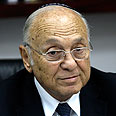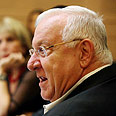Justice minister: Civilians' safety must be top priority
Internal Affairs Committee calls special session on recent surge in violence. Justice Minister Ne'eman says main problem is law enforcement, Knesset Speaker Rivlin warns 'crime has introducing fear into society,' Police Chief Cohen says police will show zero tolerance towards violent offenders
"There is no law enforcement, because there are as many financial crimes in Israel as there is sand on the seashore. The courthouses are burdened with them, almost everything here is an offence, and our priorities must be determined," he said.
The minister painted a bleak picture of the country's current state: "We are in a very serious situation with the war on crime – organized crime, murders, what is happening in the streets and breaking into houses –there is no doubt that this should be on the agenda as a top priority."
Ne'eman stressed that the main problem is with law enforcement in Israel.
"There is a tendency to blame the police, the judges, the prosecution," he said, "The problem is not the plea bargains, but the overloaded courthouses. Trials should run consecutively, and the lawyers also have a hand in this – they don't show up one morning because they are sick, or because their mother-in-law passed away, and the trial is postponed by a few more months. I hope today's session will bring about an urgent solution."
Also speaking at the meeting was Internal Security Minister Yitzhak Aharonovitch, who defended the Israel Police and demanded more funds to help fight crime. The current internal security budget is set at NIS 13 million (roughly $3.4 million) per year.
"It doesn't begin and end with the police… It starts at home, moves on to the schools, and later we come across it in the streets, on the roads and in clubs," he explained.
In a rare move, Knesset Speaker Reuven Rivlin arrived at the meeting and expressed a growing concern.
"I used to think the rumors about protection money were an exaggeration, but I've been hearing them more and more, and receiving letters addressed to the Knesset from people asking to come and protest that life in Israel is becoming more and more difficult," he said.
Part of the reason for this, Rivlin said, is that "crime is introducing calamity and fear" in Israel, forcing "people to weigh considerations improper for a proper society".
'Fighting crime should be a national priority'
Rivlin vowed to propose bills tailored to fight the growing crime rate immediately following the Knesset's recess, "including bills attempting to find a solution for the victims whose situation is nearly intolerable".
"We are in a whirl of priorities that create a situation in which the rule of law can no longer provide us with the assistance we need," he added.
Police Commissioner Dudi Cohen, who also appeared before the committee, said that "this is the time to back the police with actions, rather than words. Fighting crime should be a national priority… The police will continue to have zero tolerance towards violence."
Cohen briefed the committee members of the investigations of recent violent incidents, asking the police not be the only focus for criticism. The commission added that "while this offers little comfort, the number of murder cases in Israel is – for lack of a better word – 'stable' compared with other counties worldwide."
Cohen also said that current government policies "constitutes a strategic threat. We are not avoiding responsibility – the Israel Police needs 1,000 new police officers every year, for the next five years, that means NIS 1 billion a year."
MK Yohanan Plesner (Kadima) criticized the police data presented to the committee, saying the department's case classification system was meant to paint a picture more positive than reality.
Commissioner Cohen answered by saying that misclassification "is a disciplinary offence in the force. We had cases like that in the past and they were dealt with harshly… Your statement indicates only lack of professional knowledge and you're misleading the public."
Committee Chairman MK David Azoulay (Shas), was also in favor of government intervention. "The burden cannot fall on the police alone," he said. "A police officer earning such a low salary cannot stand firm before criminals and felons. Unfortunately citizens have lost their self-confidence and we must return it to them," Azoulay added.



















